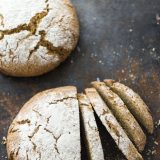Clinging to a hill amidst a tangle of cobblestone alleyways, hairpin turns and waves of wood smoke and the smell of freshly baked bread, the whitewashed bakery affords a stunning view—the Douro River giving way to the undulating terra-cotta roofs of the Portuguese countryside.
Towers of split logs, smelling of pine, sidle up to the one-story building. Geese kept as family pets honk in the yard. There is no sign.
Inside Padaria Arminda & Neto, a bare room is lined with sacks of flour five deep. It is dominated by an antique yellow mixer that in a previous life made gunpowder for the military. Now, it handles half-ton batches of dough for the Neto family. They have spent nearly 200 years in the village of Avintes dedicated to making one product—cornbread.
Known as broa, Portuguese cornbread shares little but name with the honeyed, cakey version familiar to Americans. Beneath a crackling, creviced crust, the heart of broa is dense, moist and deeply flavored, a tug of war between earthy rye and sweet corn.
The bread's roots lay in Portugal's golden era, when corn brought from the New World began to thrive in the Minho region, north of Porto. Further inland, rye was a cash crop. Broa brought the flours of both together, eventually becoming a standard at Festa de São João (or St. John’s festival), Portugal’s biggest party, which happens each June. The bread is topped with grilled sardines or chorizo, or with butter or jam for breakfast. Or with anything.
Broa’s simple roots and ubiquity—in restaurant bread baskets; sold by weight in plastic-wrapped hunks at supermarkets, like gourmet cheese—mean the Portuguese regard it as rather pedestrian. In the United States, this kind of cornbread would be labeled artisanal and fetch a premium.
At Padaria Arminda & Neto, owner Manuel Neto rises at 2 a.m. to start the fire in the 100-year-old brick-and-granite oven. Once the oven reaches a searing 600°F, the 60-year-old cleans out the embers and ash; as the oven slowly cools, the bread will cook in its residual heat. The dough has been rising since the day before. An assembly line of three other workers forms, small wooden bowls in hand.
The first baker leans into the mixer to load dough into a bowl coated with flour, then dumps it into the bowl of the second baker, who gently tosses it in the air a few times to form a ball. The third catches it in yet another bowl, shimmies it around to form a cylinder, then turns it upside-down onto Neto’s waiting wooden paddle. He slides each loaf deep into then seals the ragged steel door shut.
Loading one batch into the oven takes 90 minutes. The resulting loaves are dark and dense, a third the size of a loaf of Wonder Bread but twice the weight, with a crust as crunchy as granola. The interior is sticky, caramelized, with a whiff of molasses.
The wooden bowl, called a padejadeira, is one of broa’s secrets, sometimes even to health inspectors. In Braga, a town about 45 minutes north known for a lighter, more common variety of broa, one baker said she hides her padejadeira when inspectors come. Another showed off his well-worn bowl—still caked with flour—but said now he’s supposed to use stainless steel because it’s not porous. A third said the wooden ones are allowed as long as they’re treated right, because tradition is important.
“They wanted a lot of stuff to end,” Manuel Santos, owner of Braga’s Padaria Primorosa, says of health regulators. “But they had to come to a compromise. Some things, if you take away the tradition, you take away from the product itself.”
Santos stands in back of the bakery his father bought after a few drinks on St. John’s Day in 1962. The floor is slick with a fine film of flour. The modern wood-fired oven intermittently roars as a jet of fire shoots inside. He joins the two head bakers, and they work in tandem, tossing dough into the air before plopping the balls onto a canvas conveyer belt. With one push, 25 loaves glide into the oven.
This broa turns out larger, flatter, yet still dense and moist, with more of a crumble. Butter seeps into my warm, hefty slice. The pairing feels like a savory dessert.
A line snakes out the door. Tubs of butter labeled with customers’ names wait behind the counter. Despite the devoted following, increased competition from supermarkets has chipped away at Padaria Primrosa’s business, and other pressures loom. Santos says he doesn’t know what he’ll do once his bakers retire. They’ve been here since 1973.
“People don’t want a baker’s life anymore,” he says.
In Avintes, Neto’s daughter and son passed on a life of graveyard shifts and instead became mechanical engineers. Quite a generational shift from Neto’s mother, who used to carry loads of broa in a basket on her head down to merchant boats on the river.
“It is difficult to carry a basket of 50 kilos of broa on your head,” he says with pride.




